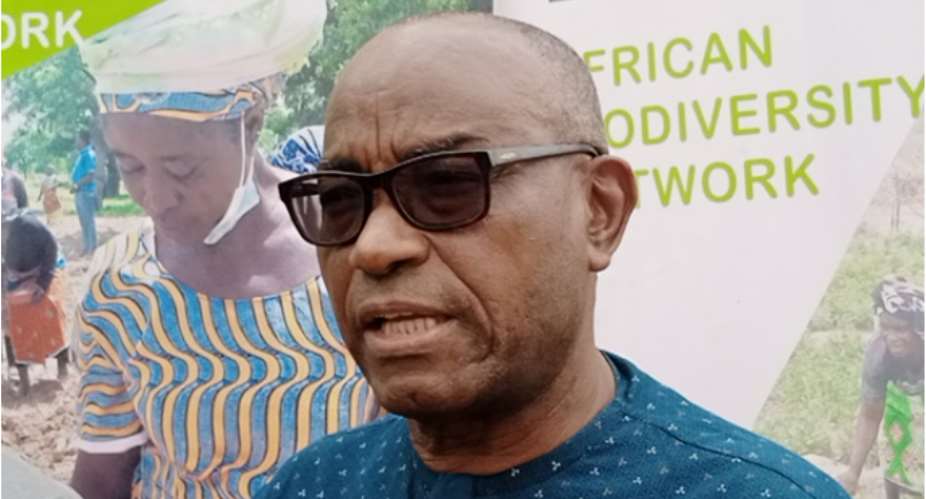The African Biodiversity Network (ABN) in partnership with Rains-Ghana has held a sensitization workshop in Tamale, the Northern Regional capital to discuss sacred sites-related issues and to complement science and indigenous knowledge.
The 3 days workshop in Tamale brought members of the African Biodiversity Network from Kenya, Uganda, Togo, Burkina-Faso, Benin, Ghana, custodians of land (Tindanima) and some staff of Rains-Ghana to consider an action plan to protect sacred natural sites and right of nature.
Both members of the network and participants at the workshop bemoaned how modernization had steadily destroyed cultural beliefs and sacred sites in most communities in Africa, with some individuals encroaching sacred sites for their personal gains.
Addressing Journalists, Chairman of the African Biodiversity Network, Dr. Alhassan Musah said every society and individual has a unique story of origin which need to be protected.
He observed that the public has been brainwashed by religion. “Most people turn to look down on sacred sites as if they are things you can’t even talk about and that they are almost contradictory to our Christian or Muslim belief system, our very own people have stop believing our cultural practices.”
He said the African Biodiversity Network (ABN) with other international partners had developed an approach aimed to change the narrative.
“As Africans derive their identity from their ancestry, it's important for us to protect the culture of our ancestors which defines us as people, as you can see, we have involved traditional rulers who are custodians of the land for them to also add their voice how we can all partner to find solution to the happenings, for example, we take the Ashantis, the Golden Stool, even though the Golden Stool is a stool, but it is linked to the very heart and roots of the history of the Ashanti people.”
General Coordinator of the African Biodiversity Network, Dr. Fassil Gebeyehu Yelemtu said as part of the network programmes they want to impose a policy to safeguard the practices of custodians and indigenous storage.
“We also want to impose what we call future thinking where custodians of indigenous knowledge and communities which cultural and traditional practices will have a knowledge of nature and different way of looking the world from their own perspective which has been let down sometime over a century.
“The knowledge of custodians of the land in Africa have been denigrated for years due to foreign imposition and overview of nature.”
He said the foreign imposition has affected development planning, government policy and many ranges of interest areas, hence African Biodiversity Network is concerned to revitalise the lost indigenous knowledge and practices.
“In collaboration with our partners, we developed a methodology called multiple evidence-based where we try to link science and indigenous knowledge to collaborate in equal studies to complement one another,” he emphasised.
ADDRESS MADE BY CHAIRMAN OF THE AFRICAN BIODIVERSITY NETWORK, DR. ALHASSAN MUSAH AT THE WORKSHOP.
RAINS has been at the forefront of pioneering interventions that make meaning to people and in manner that does not compromise the ability of future generations to live fulfilling lives.
RAINS has stayed true to this belief and cause in a world that is increasingly becoming chaotic. As a result of unsustainable practices and what I choose to call 'the arrogance of the human ' the earth community is at a crossroads. This has presented a complicated dilemma: People who live in the 'now' but unsure where they are now. In other words, they have not fully tapped into the imaginary ideal land, but are losing out on what used to be a mutually beneficial relationship with all members of the earth community. Remember the earth community is not about only human beings.
But there is more. The digital boom has given us much more information than we could ever imagine. But they may be negative outcomes with this. It separates us from nature and other members of the earth community thereby weakening the unique relationships that contributed to resilience and order. Others have called this nature deficit disorder.
And so the theme for today's workshop is appropriate as we seek to get reasonable balance between modern scientific knowledge and what I often call appropriate knowledge. We look forward to hearing the experiences of others, and having fruitful discussions. You are welcome to Ghana.
By Nurudeen Ibrahim





 Minority will expose the beneficial owners of SML, recover funds paid to company...
Minority will expose the beneficial owners of SML, recover funds paid to company...
 Prof. Opoku-Agyemang has ‘decapitated’ the NPP’s strategies; don’t take them ser...
Prof. Opoku-Agyemang has ‘decapitated’ the NPP’s strategies; don’t take them ser...
 Abubakar Tahiru: Ghanaian environmental activist sets world record by hugging 1,...
Abubakar Tahiru: Ghanaian environmental activist sets world record by hugging 1,...
 Prof. Naana Opoku-Agyemang will serve you with dignity, courage, and integrity a...
Prof. Naana Opoku-Agyemang will serve you with dignity, courage, and integrity a...
 Rectify salary anomalies to reduce tension and possible strike action in public ...
Rectify salary anomalies to reduce tension and possible strike action in public ...
 Stop all projects and fix ‘dumsor’ — Professor Charles Marfo to Akufo-Addo
Stop all projects and fix ‘dumsor’ — Professor Charles Marfo to Akufo-Addo
 Blue and white painted schools will attract dirt shortly – Kofi Asare
Blue and white painted schools will attract dirt shortly – Kofi Asare
 I endorse cost-sharing for free SHS, we should prioritise to know who can pay - ...
I endorse cost-sharing for free SHS, we should prioritise to know who can pay - ...
 See the four arsonists who petrol-bombed Labone-based CMG
See the four arsonists who petrol-bombed Labone-based CMG
 Mahama coming back because Akufo-Addo has failed, he hasn't performed more than ...
Mahama coming back because Akufo-Addo has failed, he hasn't performed more than ...
